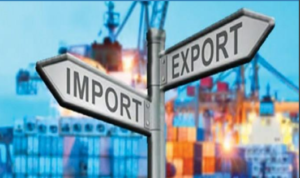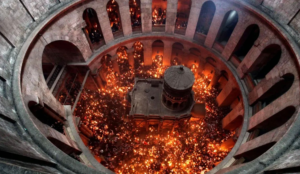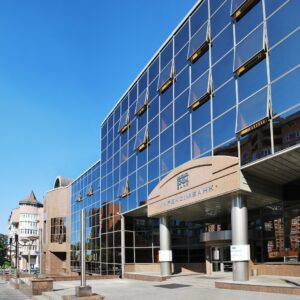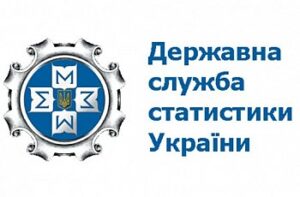
“In August 2022, we entered the premises of the first building of our all-Ukrainian clinic for the first time. In October, renovation work began here and in April, after a record 5 months, we opened the doors of the first building of the Superhumans Center,” the statement reads.
“Superhumans is not just a clinic, not just a network of clinics, it’s a philosophy and rightly so. The rebuilding of a country begins with the rebuilding of each individual, military or civilian. Child or adult. And when we see the creation of such a center, we see the creation of a place of strength,” said First Lady Elena Zelenskaya, the center’s ambassador, at the opening.
“For me, it’s a personal obligation, my way of giving thanks to those we win. The military and civilians who paid for our country’s freedom with their own health will receive at Superhumans the most advanced technology, the best medical expertise from around the world, an individualized itinerary – everything they need to get back to active life,” said Superhumans co-founder Andrew Stavnitzer.
“We are honored to be part of this extraordinary effort to help world-class Ukrainians who have been terribly injured in this war – they are truly ‘Superhumans.’ Russia’s full-scale invasion of Ukraine is a war against civilians.
Many men, women, and children will lose life or limb, even long after the war is over, due to the sheer number of mines in large parts of Ukraine. This center is a step toward giving Ukrainians a chance to rebuild their lives and their country,” said Howard G. Buffett, chairman and CEO of the Howard G. Buffett Foundation.
The Superhumans Center is a comprehensive medical facility that will prosthetically treat and rehabilitate patients, primarily those who have been injured as a result of Russian aggression.
The first phase of the center, a prosthetic workshop and part of the rehabilitation center, were opened April 14. According to Vladimir Golovatsky, deputy medical center, more than sixty medical specialists will work in the center. Annually about 3 thousand patients will be treated there.
Investment in the launch of the Superhumans rehabilitation medical center in Lviv is estimated at $54 million, Superhumans CEO Olga Rudneva said earlier.
The first stage of the project includes repairs of premises, purchase of equipment, a year of medical team salaries and purchase of materials for prosthetics.
The second and third phases include the launch of all the buildings of the hospital, the start of the educational center on the basis of Superhumans, and expansion to other regions of Ukraine, in particular, to Kharkiv.
The project has already been supported by the Howard Buffett Foundation, the Richard Branson Virgin Unite Foundation, Cargill, Payoneer, Freedom Finance, Loro Piano, Mastercard, SD Capital and others.
A memorandum of cooperation was signed between Superhumans and the Ministry of Health. Health Minister Viktor Lyashko noted that the joint goal is to provide Ukrainians who suffered war injuries with the world’s best expertise.
Ottobock, a German manufacturer of technologies for manufacturing various types of prostheses, orthoses and exoskeletons, is working with the Superhumans project to launch a laboratory for the production of prostheses. Ossur, a leading manufacturer of bionic and other prostheses from Iceland, is also advising the team on starting its own production of prostheses.
The project is being created at the initiative of Ukrainian businessman Andrei Stavnitser. Another of its founders is Philip Grushko.

Ukraine’s negative balance of foreign trade in goods in January-February 2023 increased 3.4 times compared to the same period in 2022 – to $3.713 billion from $1.083 billion, the State Statistics Service (Gosstat) reported on Friday.
According to her data, exports of goods from Ukraine during this period compared to January-February 2022 decreased by 42.8% – to $6.459 billion, imports – by 17.9%, to $10.172 billion.
The State Statistics Committee specified that seasonally adjusted exports rose 4.8% to $3.543 billion in February-2023 compared to January-2023, while imports rose 3.2% to $5.79 billion.
The seasonally adjusted foreign trade balance in February-2023 was negative at $2.248 billion, while in the previous month it was also negative at $2.23 billion.
The January-February 2023 import coverage ratio for exports was 0.64 (January-February 2022 – 0.91).
The State Statistics Committee specified that foreign trade operations were conducted with partners from 206 countries.

On Saturday, April 15, at 14:00, NTN will broadcast live from Jerusalem the descent of the Holy Fire in the Church of the Holy Sepulcher.
Every year, on the eve of Easter, millions of people around the world watch this event with bated breath. Thousands of believers gather in Jerusalem on this day. On Holy Saturday, NTN viewers, together with pilgrims from different countries, will witness the miracle that became a symbol of Christ’s Resurrection.
In addition, the live broadcast of the descent of the Holy Fire will be available on the YouTube channel and Facebook page of the Witness project.
We congratulate everyone on the upcoming Easter! May the Holy Feast enter every home, fill our hearts with joy and grace, and give us all peace!

State-owned Ukreximbank (Kiev) has put up for auction the claim for the unfinished Sky Towers complex in the center of Kiev at a starting price of UAH 5.580bn.
The auction will be held according to the Dutch model (with price reduction) on May 11 at OpenMarket (SE “SETAM” of the Ministry of Justice).
An attempt to sell the asset had previously been undertaken by the state bank in November 2021 with a starting price of UAH 7.145 billion.
The bank report emphasizes that this is an offer “for an ambitious investor, ready to put an end to the epic of one of the most famous construction projects in the city”, specifying that the 47-storey complex of 223 th sq.m. is completed only up to 28 floors.
It should include two towers of 47 and 34 floors, office and retail premises, 8-level underground parking lot for 900 cars built on the land plot of 0,74 ha located in Sholudenko Street which was also mortgaged by the bank.
It is noted that additional liquid security is the array of 60 land plots with a total area of more than 80 hectares, located within Zazimskiy rural council of Brovarskiy district of Kyiv region.
Also pledged to the bank were property rights for design-bidding and design-budget documentation for building of a community center, and a 100% share in the authorized capital of a debtor legal person.
The possibility of transferring to this facility of the capital mayor’s office was discussed in early 2018 by the Kiev Investment Agency, the completion was estimated at $370 million. At the start of the project was estimated at $512 million.
As reported, Sky Towers on Pobedy Avenue, 13 could become the first Ukrainian skyscraper higher than 200 m (projected height of 214 m). The construction was carried out up to 2015, but reached 28 floors with a design height of 47, after which it was stopped. According to the director of the development company “Agency of Office Construction” Alexander Demin, preservation of the object was not carried out.
Credit agreement with Ukreksimbank was concluded in 2007. In May 2012, the KDD Group, which has fallen into a difficult financial situation, signed an agreement to sell the American Cimbrorum Holdings LLC for $ 202.4 million project Sky Towers and the residential complex “Zazimye. Of this amount, KDD was to receive $12 mln in cash, while the rest was obligations, including $168.4 mln to Ukreximbank. At the same time, the bank increased the credit line for the completion of Sky Towers to $193 million, and the borrower was the Office Construction Agency.
In 2019, the parties signed a financial restructuring plan, but the developer continued to default. The Economic Court of Kyiv in early 2021 satisfied the claim of Ukreximbank to recover from the Agency of Office Construction 5.95 billion UAH of the debt on the loan to finance the construction of Sky Towers.
According to the Unified State Register of Legal Entities and Individual Entrepreneurs, the founder of the Office Construction Agency LLC with registered capital of UAH 442 million is the American Taccadero Trading Limited, with David Israel as the ultimate beneficiary.
Ukreximbank was founded in 1992, and the only owner is the state.
According to the National Bank of Ukraine, as of November 1, 2022 Ukreximbank in terms of total assets ranked third (267.423 billion UAH) among the 67 operating in the country.

On Friday, April 14, a large part of Ukraine will remain cloudy, sometimes with rain, according to the Ukrhydrometeocenter.
On the left bank and in Kyiv region at night, light rain is expected, in the eastern regions, in Transcarpathia and the Carpathians in the daytime moderate rains; in the rest of the territory without significant precipitation.
According to the Ukrhydrometeocenter, fog is expected in the western, southwestern and central regions at night and in the morning. The wind is predominantly northeasterly, 5-10 m/s.
The temperature at night will be 3-8°, daytime 10-15°, in the southern and western regions 13-18°, in Transcarpathia up to 22°; in the Carpathians at night from 2° warm to 3° frost, daytime 9-14° heat.
Friday, April 14, in Kiev, it is slightly raining at night, while during the day there are no significant precipitations. The wind is northeastern, 5-10 m/s. The temperature at night is 6-8°C, while during the day it is 11-13°C.
According to the Central Geophysical Observatory. The highest daytime temperature of April 14 in Kiev was 25.4°C in 1972, the lowest night-time temperature was -3.9°C in 1928.
On Saturday, April 15, at night in the eastern part of the country and the Carpathian region, and during the day on the Right Bank, rains are expected, sometimes with thunderstorms, and in some areas with hail; in the rest of the territory, without precipitation.
Winds are mostly south-east, 7-12 m/s. The temperature at night is 4-9° of heat, 10-15° during the day, in the south of the country in some places 16-21°; in the east and Sumy regions at night from 4°C to 1°C of frost, while during the day – 5-10° of heat.
In Kiev, Saturday, April 15, at night precipitation is not expected, while rain during the day, sometimes with a thunderstorm. The wind is mainly southeastern, 7-12 m/s. The temperature at night is 6-8° warm, while during the day it is 12-14°.

The Ministry of Digital Transformation (Ministry of Digital Transformation) will launch an updated statistics portal created as part of the global digital transformation of the State Statistics Service (Gosstat) by mid-year instead of the current website, Deputy Prime Minister for Innovation, Education, Science and Technology Development – Digital Transformation Minister Mikhail Fedorov said in Telegram on Wednesday.
“At the heart of the transformation is an IT platform. It collects and processes data in real time, presenting it in the form of interactive dashboards so that scientists, journalists and businessmen can quickly find the necessary information,” Fedorov wrote.
According to the head of the Ministry of Digital, now all data are collected manually from different sources and in different formats. They are long processed in outdated systems and then distributed in the form of statistical files through Gosstat.
“Therefore, we need to fundamentally change this approach,” Fedorov stressed.
He specified that the Ministry plans to present an updated statistics portal in the summer.
The Ministry of Digital Transformation has been conducting transformations in the Gosstat since 2021 as part of the Swiss-Ukrainian program EGAP, implemented by the Eastern Europe Foundation.
The audit of business processes and IT infrastructure of Gosstat was carried out in cooperation with EPAM IT company. It also participated in developing a strategy of digital transformation, it said.
According to Forbres.UA, the total cost of the project is about 55 million UAH, which were allocated within the program EGAP. The publication also reported that after the implementation of changes, the staff of the State Statistics Service will be reduced by about 30%. In 2022, the staff of the state agency was reduced from 6,000 to 4,600 employees, including by eliminating duplicate functions in the regional offices.
EPAM Systems Inc. was founded in 1993 and develops custom software for various sectors of the economy. The company has offices in 25 countries and provides services to customers in more than 40 countries.